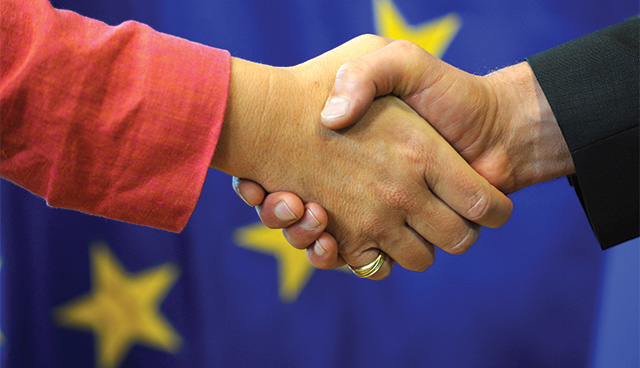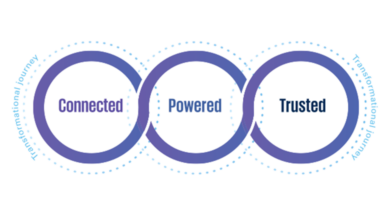The EU’s digital decade

In March 2021, the European Commission laid out its vision for digital transformation in Europe from 2021 to 2030, a timeframe it is terming the EU’s ‘Digital Decade’.
The Commission plans to use both “a robust joint governance framework to monitor progress and address insufficiencies” and “multi-country projects combining investments from the EU, member states and the private sector” to achieve the targets it has set out for the digital decade. The most notable of these targets fall under four main groupings.
Skills: In terms of digital skills, the Commission aims for there to be at least 20 million ICT specialists in Europe, with gender convergence in this workforce. It is also hoped that a minimum of 80 per cent of the European population will possess basic digital skills by 2030.
Digital infrastructure: “Gigabit for everyone, 5G everywhere” reads the first of the Commission’s aims in this regard, with plans also afoot to double the EU’s share in global production of cutting-edge semiconductors. In terms of edge and cloud data, the Commission plans to have 10,000 climate neutral highly secure edge nodes by 2030. It also hopes to see the building of the EU’s first computer with quantum acceleration.
Digital transformation of business: The Commission has set a target of 75 per cent of EU companies using cloud, artificial intelligence (AI), and/or big data by 2030. It plans to “grow scale ups” and finance and to double the number of EU unicorn companies, a process that has already begun, with 23 companies becoming unicorns in 2021 as of June, compared to just eight in the whole of 2020. It is also hoped that more than 90 per cent of European SMEs will “reach at least a basic level of digital intensity”.
Digitalisation of public services: The Commission has set ambitious targets for the governments of its member states, with 100 per cent of key public services to be available online and 100 per cent of citizens having access to digital medical records by 2030 if targets are met. The Commission has also set an 80 per cent target for citizens using digital ID.
A framework of digital principles will be established to “help promote and uphold EU values in the digital space”, with the framework to be “identified through a wide societal debate”. Examples given by the Commission as to what this debate could concern include:
Digital rights
- • Freedom of expression and access to diverse, trustworthy information;
- • Freedom to conduct business online;
- • Protection of personal data and privacy; and
- • Protection of the intellectual creations of individuals.
Digital principles
- • A secure and trusted online environment;
- • Universal digital education and skills;
- • Access to digital systems and devices that respect the environment;
- • Accessible and human-centred digital public services;
- • Ethical principles for human-centred algorithms;
- • Protecting and empowering children online; and
- • Access to digital health services.
The Commission proposes to reach the above targets and build the governance framework through its Path to the Digital Decade, which will be based on an “annual cooperation mechanism” between the Commission and member states, whereby the Commission will develop projected trajectories and the member states will formulate national roadmaps to meet these targets.
This proposed cooperation mechanism will consist of a “structured, transparent and shared monitoring system” which will be based on the Digital Economy and Society Index, an annual progress report throughout the digital decade, multi-annual digital decade national roadmaps, a “structured framework to discuss and address areas of insufficient progress through joint commitments between the Commission and member states”, and a mechanism to “support the implementation of multi-country projects”.
The Commission has explained that these multi-county projects will typically involve investment in areas such as data infrastructure, low-power processors, 5G communication, high performance computing, secure communication, public administration, blockchain, digital innovation hubs and digital skills. The Commission advises that each member state set aside 20 per cent of the funding received under the Covid-related Recovery and Resilience Facility for digital transition projects.
An example of a possible multi-country project offered by the Commission is a network of security operations centres, powered by AI, with the goal of anticipating, detecting and responding to cyberattacks at the national and EU level. These multi-country projects “could”: combine investments from the EU budget, including the Facility, from member states and the private sector; address gaps in the identified critical capacities of the EU; and support an interconnected, interoperable, and secure digital single market. A European Digital Infrastructure Consortium is newly available to “help interested member states speed up and simplify the implementation” of these projects.
The EU states that it plans to “promote its human-centred digital agenda” globally in order to promote “alignment or convergence with EU norms and standards” and will attempt to build international partnerships by investing in improved connectivity with the EU’s partners, designing digital economy packages, and building a toolbox of regulatory cooperation, capacity building and international investment. Possible areas of cooperation mentioned include 6G, quantum computing and the use of technology to fight climate change.
The Commission is currently in discussion with member states and the European Parliament, as well as economic and social partners, in an effort to progress towards an inter-institutional declaration on digital principles by the end of 2021. Such a declaration would then allow the Commission to develop projected trajectories for each target within its Path to the Digital Decade together with member states and allow those states to formulate their national plans.





